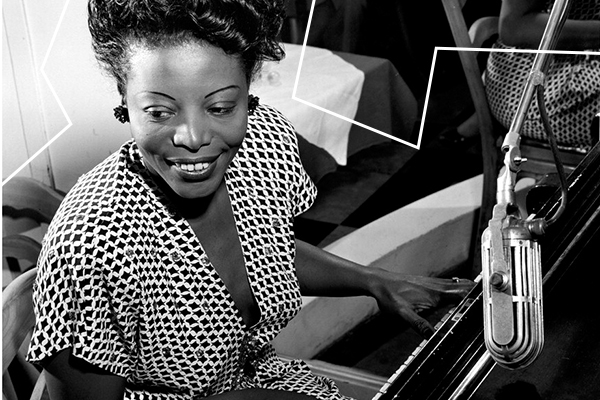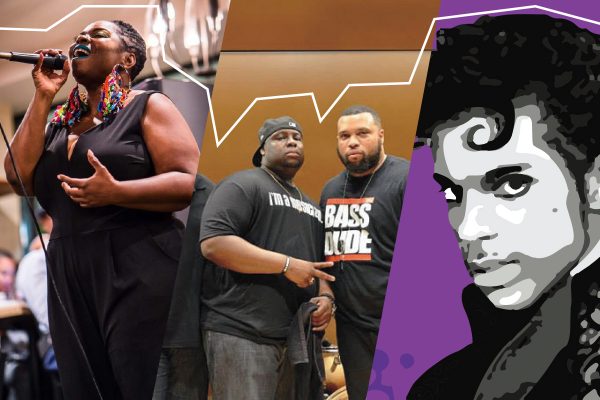Mary Lou Williams, KST Playlist

Jazz vocalist and Pittsburgh icon, Mary Lou Williams is the focus of this week’s playlist.

Jazz vocalist and Pittsburgh icon, Mary Lou Williams is the focus of this week’s playlist.
KST Deputy Director Orlana Darkins Drewery takes to Instagram Live for conversations with the KST community members. On Wednesday June 10, KST Deputy Director Orlana Darkins Drewery is joined by Executive Director of The Legacy Arts Project, Erin Perry. Listen in as they talk about the organization and their participation with six local organizations to present Hotline Ring! A Virtual Fundraiser on Thursday, July 16 from 5:00pm – Midnight.
 Since 2011, Erin Perry (Guest Wednesday, June 10) has been the executive director of the Legacy Arts Project. As a graduate of the Katz Graduate School of Business, she applies her academic training within a community setting, utilizing arts as a tool for transformation both individually as well as collectively. Miss Perry has been an active member of Legacy since 2005, participating as a member of the dance ensemble through present day. With an extensive background in teaching, Miss Perry has impacted children and adults from Wilkinsburg to Taiwan, teaching classes in English, Math, Photography, and Movement. As a mother of two growing boys, her focus continues to be grounded in the upliftment of humanity through knowledge of self.
Since 2011, Erin Perry (Guest Wednesday, June 10) has been the executive director of the Legacy Arts Project. As a graduate of the Katz Graduate School of Business, she applies her academic training within a community setting, utilizing arts as a tool for transformation both individually as well as collectively. Miss Perry has been an active member of Legacy since 2005, participating as a member of the dance ensemble through present day. With an extensive background in teaching, Miss Perry has impacted children and adults from Wilkinsburg to Taiwan, teaching classes in English, Math, Photography, and Movement. As a mother of two growing boys, her focus continues to be grounded in the upliftment of humanity through knowledge of self.

A Pittsburgh Native and a Jazz Legend, George Benson is the focus of this week’s playlist.
A Pittsburgh Native, a Jazz Legend, and KST Artist, Roger Humphries is the focus of this week’s Playlist. Enjoy this curated list of toe tapping, finger snapping tunes that showcase The RH Factor and Humphries’ incredible drumming.
On Thursday, May 28, Pryor was joined by choreographer, author, performer, teacher, and curator, Ishmael Houston-Jones.
 Ishmael Houston-Jones (Guest – Thursday, May 28) is choreographer, author, performer, teacher, and curator. His improvised dance and text work has been performed in New York, across the US, and in Europe, Canada, Australia, and Latin America. Drawn to collaboration as a way to move beyond boundaries and the known, Houston-Jones celebrates the political aspect of cooperation. He and Fred Holland shared a 1984 New York Dance and Performance “Bessie” Award for Cowboys, Dreams and Ladders, which reintroduced the erased narrative of the Black cowboy back into the mythology of the American west. He was awarded his second “Bessie” Award for the 2010 revival of THEM, his 1985/86 collaboration with writer Dennis Cooper and composer Chris Cochrane. In 2017 he received a third “Bessie” for Variations on Themes from Lost and Found: Scenes from a Life and other Works by John Bernd. As an author Houston-Jones’ essays, fiction, interviews, and performance texts have been published in several anthologies. His work has also appeared in the magazines: PAJ, Movement Research Performance Journal, Bomb, and Contact Quarterly. His first book, Fat and Other Stories was published in 2018 by Yonkers International Press. Houston-Jones curated Platform 2012: Parallels which focused on choreographers from the African diaspora and postmodernism and co-curated with Will Rawls Platform 2016: Lost & Found, dance, New York, HIV/AIDS, then and now. He has received a 2016 Herb Alpert, a 2015 Doris Duke Impact and a 2013 Foundation for Contemporary Arts Artists Awards.
Ishmael Houston-Jones (Guest – Thursday, May 28) is choreographer, author, performer, teacher, and curator. His improvised dance and text work has been performed in New York, across the US, and in Europe, Canada, Australia, and Latin America. Drawn to collaboration as a way to move beyond boundaries and the known, Houston-Jones celebrates the political aspect of cooperation. He and Fred Holland shared a 1984 New York Dance and Performance “Bessie” Award for Cowboys, Dreams and Ladders, which reintroduced the erased narrative of the Black cowboy back into the mythology of the American west. He was awarded his second “Bessie” Award for the 2010 revival of THEM, his 1985/86 collaboration with writer Dennis Cooper and composer Chris Cochrane. In 2017 he received a third “Bessie” for Variations on Themes from Lost and Found: Scenes from a Life and other Works by John Bernd. As an author Houston-Jones’ essays, fiction, interviews, and performance texts have been published in several anthologies. His work has also appeared in the magazines: PAJ, Movement Research Performance Journal, Bomb, and Contact Quarterly. His first book, Fat and Other Stories was published in 2018 by Yonkers International Press. Houston-Jones curated Platform 2012: Parallels which focused on choreographers from the African diaspora and postmodernism and co-curated with Will Rawls Platform 2016: Lost & Found, dance, New York, HIV/AIDS, then and now. He has received a 2016 Herb Alpert, a 2015 Doris Duke Impact and a 2013 Foundation for Contemporary Arts Artists Awards.
Every Tuesday at 12:30pm, KST Executive Director Joseph Hall takes to Instagram Live for conversations with arts leaders in Pittsburgh, across the USA, and internationally. Tune in, get to know Joseph, and find out how he and fellow arts leaders around the world are adapting to the challenges brought on by COVID-19.
On Tuesday, May 26th, Hall was joined by Program Officer at the Opportunity Fund in Pittsburgh, Tiffany Wilhelm.
For more information about Tiffany Wilhelm and the Opportunity Fund visit: theopportunityfund.org
Tiffany Wilhelm (Guest – Tuesday, May 26) (she/they) is a Program Officer at the Opportunity Fund in Pittsburgh, a foundation that supports the arts and social & economic justice. Previously, she was Deputy Director of the Greater Pittsburgh Arts Council where she raised funds, oversaw programming, and co-led initiatives on accessibility for people with disabilities and racial equity.
Tiffany has been involved with several collectives focused on educating and organizing for racial justice, both in Pittsburgh and in the national arts field. Prior to Pittsburgh, she was Executive Director of the Central Wisconsin Children’s Museum and taught in an undergraduate arts management program. Tiffany is part of the core facilitator team with artEquity and has facilitated with Keryl McCord’s group Equity Quotient.

Melodic Excellence through and through, these voices will take you on a ride and drop you in your feelings. Enjoy this KST curated playlist of all local artists.
Every Thursday at 2:00pm, KST Senior Producer Ben Pryor takes to Instagram Live for conversations with artists in Pittsburgh, throughout the US and around the world. They will connect on the impact of COVID-19 and adapting to working in the arts through a pandemic.
For Thursday, May 21, Ben checks in with Nigerian American performance artist, poet, and curator, Jaamil Olawale Kosoko.
Check out more on Jaamil Olawale Kosoko at the link below: jaamil.com
Jaamil Olawale Kosoko (Guest – Thursday, May 21) is a Nigerian American performance artist, poet, and curator originally from Detroit, MI. His creative practice draws from Black study and queer theories of the body, weaving together visual performance, lecture, ritual, and spiritual practice. Recent awards include a 2019 NYSCA/NYFA Artist Fellowship in Choreography, 2019 NPN Development Fund Award, 2019-21 Movement Research Artist in Residence, 2018-20 Live Feed Artist at New York Live Arts, 2017-19 Princeton Arts Fellow, 2019 Red Bull Writing Fellow, 2017 MAP Fund recipient, and a 2017 Cave Canem Poetry Fellow. His works have toured internationally to South Africa, Europe, Canada, and throughout the US appearing in festivals and venues such as The Centre for the Less Good Idea (Johannesburg), Fusebox Festival (Austin), PICA | Portland Institute for Contemporary Art, Tanz im August (Berlin), Moving in November (Finland), Within Practice (Sweden),TakeMeSomewhere (UK), Brighton Festival (UK), Oslo Teaterfestival (Norway), and Zürich MOVES! (Switzerland) among others.
He is the author of two chapbooks: Animal in Cyberspace and Notes on An Urban Killfloor. His poems and essays have been included in The American Poetry Review, The Dunes Review, The Broad Street Review, among others. Season 1 of his interview-based podcast, American Chameleon can be found on all podcast platforms. Visit jaamil.com or follow @jaamilkosoko on Instagram for more information.
Every Wednesday at 2:00pm, KST Deputy Director Orlana Darkins Drewery takes to Instagram Live for conversations with the KST community in Pittsburgh, and across the USA. Join us to see how folks are managing the impact of COVID-19. On Wednesday, May 20th, Darkins Drewery was joined by founder of Anastasia’s Crown Esthetic services, a boutique spa and salon, Yvette Royal. For more information on Yvette and Anastasia’s Crown Esthetic services, go to: https://www.anastasiascrown.com/crm/
For 20 years, Yvette Royal (Guest, Wednesday, May 20) represented such brands as Clinique, MAC, and Sephora receiving top sales honors. Yvette then packaged her expertise in the makeup and skin care industry and in 2016 founded Anastasia’s Crown Esthetic services a boutique spa and salon. While there are a plethora of services, the signature service is FDA approved endermologie for body contouring and full body waxing. She is the first African American to have an Endermologie business in the state of Pennsylvania. Yvette Royal also serves Beauty professionals and cosmetology students, conducting waxing certification classes at the salon.

For the Spring 2020 season, KST Presents invited musician, composer, and music director Dwayne Fulton to curate a series of concerts between March – May 2020. All of the concerts have been postponed for the future, but we are pleased to bring you playlists featuring the artists curated by Fulton for the series.
The final playlist in our program is a mix of all KST Sounds Artists. From the Brydge, to Anita Levels to Prince, we hope you enjoy this group of songs curated to represent our KST Sounds series.